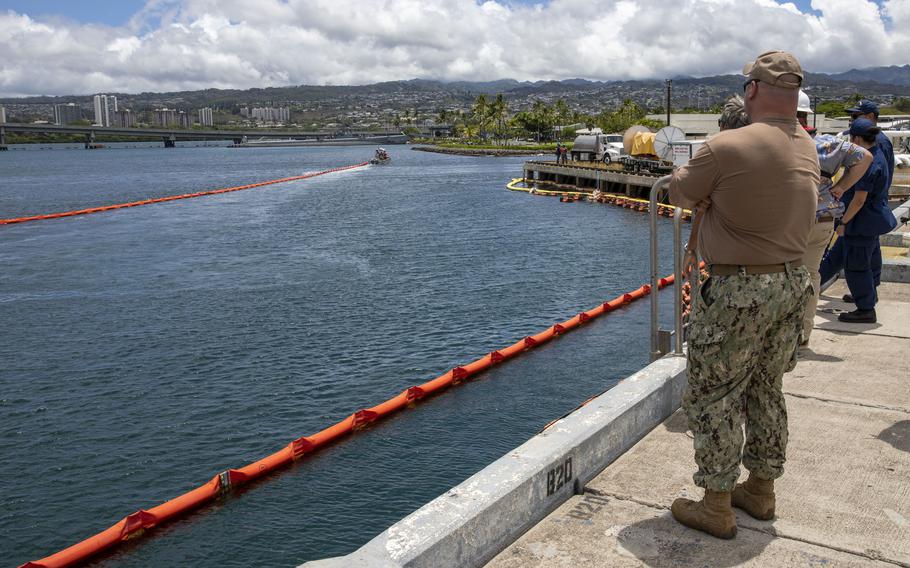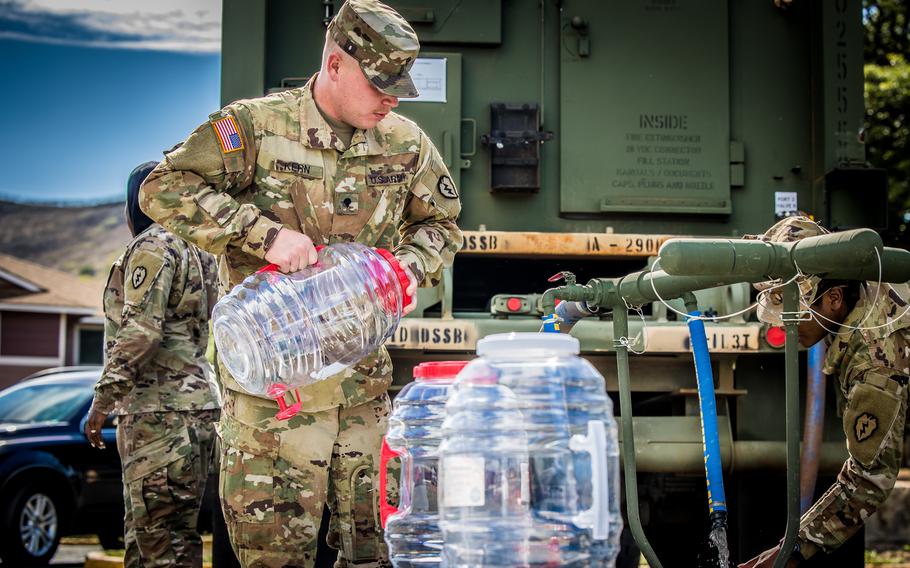
Joint Task Force-Red Hill and spill response personnel perform and observe a spill response exercise on Joint Base Pearl Harbor-Hickam, Hawaii, June 8, 2023. (Matthew Mackintosh/U.S. Army)
Another 1,000 military family members and civilians filed legal claims against the federal government Tuesday stemming from illnesses that they suffered after drinking water that was contaminated with jet fuel near the Navy’s Red Hill storage facility in Hawaii, their attorneys said.
“The Navy has long promoted secrecy over truth when it comes to water contamination and toxic exposure,” said attorney Kristina Baehr, who is representing military and civilian families in the case. “Now, 1,002 new claimants seek truth and accountability for the Navy’s failure to warn them to stop using the water the Navy knew was toxic.”
The Navy’s Red Hill Underground Fuel Storage Facility on Oahu, about 5 miles northwest of Honolulu, was closed a year ago after jet fuel was found in a well that supplied water to tens of thousands of people in military communities in the area, such as Joint Base Pearl Harbor-Hickam. Hundreds of people already have filed legal complaints against the government over the contaminated water. The new additions are now in the administrative complaint phase under the Federal Tort Claims Act, which means the government could still settle with them, the attorneys said.
“The affected military and civilian families suffer from a widening range of frightening, debilitating health effects because of the U.S. Navy’s allegedly reluctant, inconsistent delivery of medical care and its seeming secrecy,” said a joint statement by the plaintiffs’ attorneys at the Motley Rice, Just Well Law and Hosoda law firms.
“The Navy has taken responsibility for the contamination itself and promised to make it right. These claims give the Navy the chance to do so,” said Baehr, the founder of Just Well Law.
Jet fuel at Red Hill spilled into the water supply on at least two occasions in 2021, and people who drank the contaminated water experienced problems such as seizures, gastrointestinal disorders, neurological issues, burns, rashes, lesions, thyroid abnormalities, migraines and neurobehavioral challenges, according to the lawsuit already filed against the government.

Soldiers with the 25th Infantry Division distributed water on Dec. 2, 2021, at Aliamanu Military Reservation, Hawaii. Soldiers were providing support to local residents after jet fuel from the Navy’s Red Hill Underground Fuel Storage Facility spilled into the nearby water supply. (Jessica Scott/U.S. Army)
The government said in a court document filed in May that it doesn’t dispute there was a “breach of duty of care” at Red Hill and acknowledged people “suffered injuries compensable under the Federal Tort Claims Act.”
If the government doesn’t settle with the 1,002 new complainants, the cases could join the pending lawsuit — Patrick Feindt Jr. et al., v. the United States of America — in U.S. District Court, the attorneys said. The lawsuit already includes about 300 people who are suing the government over the Red Hill spill.
“The truth as to what happened at Red Hill in 2021 is indisputable. Before, during and after the contamination, as more than 93,000 military service members, their family members and civilians relied on the government for safe water on the island of Oahu, the Navy harbored toxic secrets,” the lawsuit states. “As these families would discover, the water they drank and bathed in was dangerously contaminated. And government officials knew all along.”
The attorneys said the military failed to provide adequate medical care for those who became sick, though the government has specific testing and care standards for those exposed to hazardous chemicals such as jet fuel.
“These families are still sick, and 67% of our clients report that they still have adverse health symptoms,” Baehr said.
The Pentagon and the Navy have not publicly responded to the complaints because the legal process is ongoing. But the Navy has promised Red Hill will never contaminate the community’s water supply again. The service is dismantling the storage depot, which could take about three years and cost $120 million, officials have said. Three weeks ago, the Navy also agreed to take apart the pipelines that moved fuel between Red Hill and a pump house at Pearl Harbor over concerns that leaving them intact would make it easier for the Navy to store fuel there again in the future.
“With the pipelines removed, the tanks cannot be refilled with fuel,” the Navy said this month in an update to its closure plan. “Pipeline removal is a clear and tangible demonstration of [our] commitment to the public, regulatory agencies and other stakeholders that the Red Hill facility will never be used again for storage of fuel or hazardous chemicals.”
The Navy’s plan allows for “non-fuel reuse” of the Red Hill facility, but no specific details have been provided about what it could be.